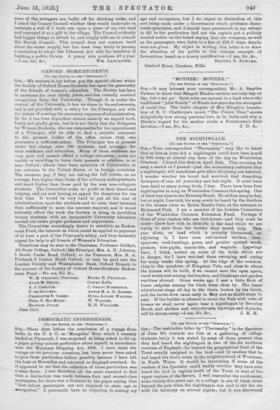THE NIGHTINGALE.
[To THR EDITOR or Till " SPROTAT011.1
Sts,—Your correspondent " Thormanby " may like to know that as late as June 3rd a nightingale could have been heard in full song at almost any hour of the day on Wimbledon Common. I heard him first on April 20th. This morning he sang a snatch as I passed—just the momentary outburst that a nightingale will sometimes give after the young are hatched. I wonder whether his brood had survived that drenching downpour of rain all yesterday and last night. It must have been fatal to many young birds, I fear. There have been four nightingales in song on Wimbledon Common this spring. One of them was close to the Beverley Brook. He seldom sang by day, but at might, I am told, his song could be heard by the dwellers in the houses close to Robin Hood's Gate, at the entrance to Richmond Park. I am a member of the London Committee. of the Wimbledon Common Extension Fund. Perhaps if those of your readers who are bird-lovers—and they must be many—knew how rich in bird-life is the land which we are trying to save from the builder they would help. This year alone, on land which is actually threatened, or adjoining it, I have seen red-backed shrikes, tree- sparrows, reed-buntings, green and greater spotted wood- peckers, tree-pipits, marsh-tits, and wagtails. Lapwings have, I think, nested on some of the fields which are in danger, for I have watched them swooping and crying. for many weeks this spring. At the edge of the common close to the meadows of Kingston Vale, and close to where. the houses will be built, if we cannot save the open space,. wood wrens nest among the bracken, and blaokcaps and garden, warblers abound. Some weeks ago I saw a little flock of lesser redpoles among the birch trees close by. The lesser whitethroat sings all day in the thorn bushes by the brook, and the turtle-dove came early in May and no doubt stays to nest. If the builder is allowed to corer the Vale with rows of houses we shall never again hear a nightingale by Beverley Brook, and shrikes and whitethroate, lapwings and skylarks, will be driven away.—I am, Sir, dr.c., J. R. H.










































 Previous page
Previous page